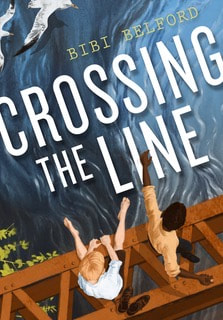|
I am a Chicago girl - born and raised. And I love history, which is why I am a middle-grade historical fiction author. But I know that sometimes history is not so kind. In fact, it can be cruel. Chicago has some great events - The World Columbian Exposition for one; but I'm not proud of the corruption or racial tragedies in our past. Today, I'm featuring a Q & A with Bibi Belford, a fellow #SCBWI_IL and #ReadLocalIllinois author who brings one of these unfortunate events to life in her novel, Crossing the Line. What inspired you to write Crossing the Line, a historical fiction novel set in 1919 Chicago? I was riding my bike along the Lakeshore Path and noticed a rock with a plaque. I went to read it and thought it was strange I’d never heard of a boy named Eugene Williams who drowned in Lake Michigan because he was hit with a rock. I went home and started researching and couldn’t stop. I was so angry that my education had left such holes in my knowledge and wanted kids and their teachers to have an exciting resource to introduce them to the history of the Chicago race riots. You set the scene of a summer friendship in 1919 Chicago. How much research went into getting all of the characters’ voices period-appropriate, including Billy’s Irish voice? I read many diary entries from the 1900s as well as period literature, including a few chapters of Studs Lonnigan by Farrell. I didn’t want to pattern Billy after Studs, but hoped to get the gist of the speech patterns. Also, one of my grandparents came from Ireland around that time period and settled in Detroit. My father was born in Detroit in 1927, and we visited his boyhood home frequently for holidays. How hard was it to write the poignant scenes, and did you find yourself getting emotional over what these boys went through between the after effects of WWI, poverty, and racial tensions? As I wrote the book, things were happening in the world that made Crossing the Line so real that I did struggle to write some of the scenes. When I saw news clips of the mothers and fathers grieving for their murdered sons, I felt so strongly how Foster’s daddy must have been torn between protecting his remaining son and rescuing his other two sons. And how much restraint and resilience people must have had not to become bitter and hateful toward a society that perpetrates such disregard for human life. I also remembered the ending of one of my friendships over moral and ethical issues and when Billy and Timmy go their separate ways, I felt that division all over again. Where can young readers learn more about these events in Chicago history? Ideally, visit The African-American Smithsonian Museum. The displays start with slave ships and progress to the Civil Rights Movement. It’s not entertaining, but earth shattering and heart-breaking. The Dusable Museum in Chicago is a little closer and also has great exhibits. I haven’t found any fiction books for kids that are set in 1919-1920, but there are other great historical fiction books about the history of the Black struggle in the U.S. Claire Hartfield wrote A Few Red Drops: The Chicago Race Riot of 1919. She and I did a panel discussion at The Chicago History Museum. Laurie Halse Anderson wrote a great trilogy about runaway slaves during the Revolutionary War. Christopher Paul Curtis wrote two books set in 1936 during the depression, Bud Not Buddy, and The Mighty Miss Malone, and The Watsons Go to Birmingham, set in 1963. Also, keep checking new releases. These subjects are currently hot topics. A summary of Crossing the Line, the Award-Winning Middle Grade Novel Inspired by the True Events Leading Up to the 1919 Chicago Race Riots Some people think there’s a line, and if everybody stays on their side of the line, then we’ll all get along just fine. That’s what Billy’s da told him, back before he joined up in the Great War. Da said that sometimes, to do what’s right, you gotta cross that line. Course, that was before the war ended and Billy’s da came home with shell shock. Now it’s up to Billy to be man of the house, to take care of his ma and sisters and work at the docks when he can. He ain’t no coward, and he don’t complain, not even when money troubles mean he has to change schools. It’s hard times for all the Irish—maybe even for all of Chicago. And it gets harder when Billy becomes friends with Foster, a black boy who loves baseball and whose daddy went to war, too. What seems like just horsing around to them—building a raft, spending time in their secret hideout by the creek—stirs up trouble when the rest of the city gets wind of it. Soon, the boys’ friendship has triggered a series of events that will change both their lives forever. And with racial tensions in the city coming to a head, Billy must decide once and for all what it means to be courageous, to be a friend, and to truly cross the line.  You can connect with Bibi here: And here are links to purchase: Indie Bookshop Amazon Thanks so much, Bibi, for sharing your story with us! For another #diversity novel, see last week's Q & A post, Lift as You Climb.
0 Comments
Your comment will be posted after it is approved.
Leave a Reply. |
Good News!My MG Biblical fiction "The Heart Changer" debuted in 2019 with Ambassador International. Categories
All
|

 RSS Feed
RSS Feed